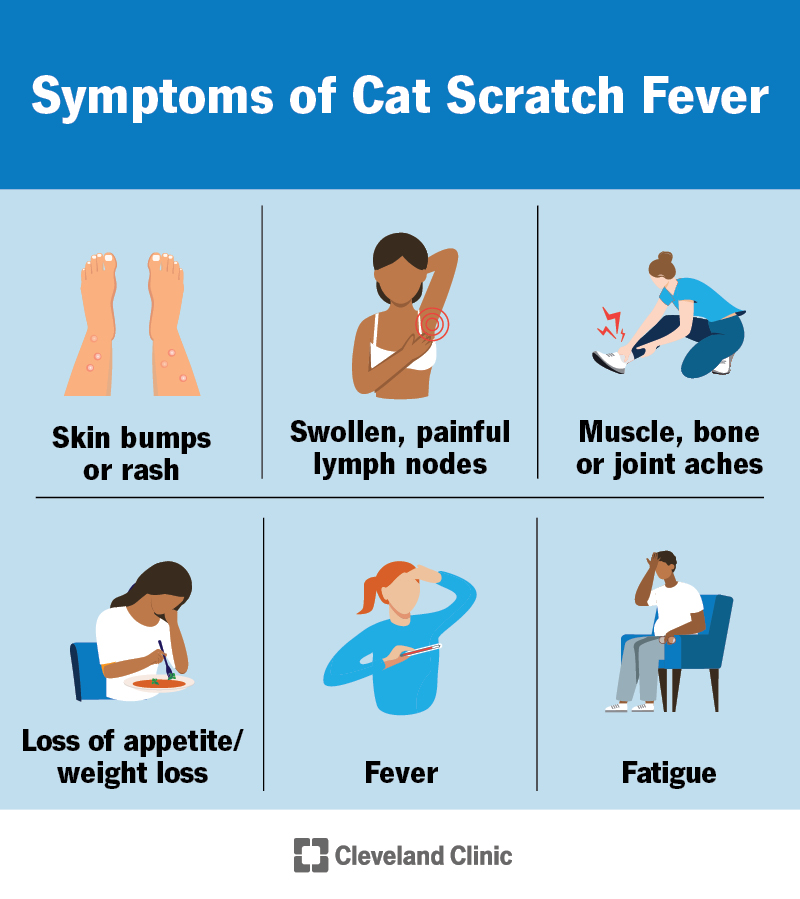Ever wondered why it itches when a cat scratches you? You’re not alone.
That annoying itch isn’t just a random occurrence; there’s science behind it. This seemingly minor irritation can make you question your choice of feline companionship. But don’t worry, there’s more to understand. By diving deeper into this common experience, you’ll uncover surprising facts that could change the way you think about those tiny claws.
Before you know it, you’ll be armed with knowledge to soothe that itch and maybe even bond better with your furry friend. Keep reading to discover why your cat’s scratches leave more than just a mark.

Credit: my.clevelandclinic.org
How Cat Scratches Affect The Skin
Cat scratches may seem like a minor annoyance at first, but they actually affect your skin in several important ways. Understanding how your skin responds can help you manage the itch and avoid complications. Let’s take a closer look at what happens beneath the surface when a cat’s claws make contact.
Physical Damage From Claws
Cat claws are sharp and can easily break the skin’s surface. This creates small cuts or puncture wounds that might not seem serious but can cause discomfort. The depth and length of the scratch depend on how hard the cat scratches and the sharpness of its claws.
These scratches can tear the outer layer of your skin, exposing sensitive nerve endings. That’s why even a tiny scratch can feel painful or itchy right away. Have you ever noticed how a shallow scratch often itches more than a deeper cut? This is because the skin is trying to heal itself and protect the injured area.
Skin’s Reaction To Injury
Your skin reacts quickly to any break in its surface. As soon as a cat scratch happens, your body sends immune cells to the area to fight off any bacteria. This immune response often causes redness, swelling, and itching around the scratch.
The itch is your body’s way of signaling that it’s repairing the damage. Sometimes, the scratch can even become infected if bacteria from the cat’s claws enter the wound. If you notice increased pain, pus, or warmth around the scratch, it’s important to clean it well and watch for signs of infection.
Have you ever wondered why scratching an itch sometimes makes it worse? Your skin releases histamines during the healing process, which can increase that itchy sensation. Resisting the urge to scratch can help your skin heal faster and reduce irritation.
Role Of Allergens In Cat Scratches
Cat scratches can often lead to an itchy sensation, and one key reason is the presence of allergens. These allergens come from the cat’s body and can easily transfer to your skin during a scratch. Understanding how these allergens work helps you better manage the discomfort and take steps to protect your skin.
Cat Dander And Saliva Residue
Cat dander consists of tiny, even microscopic, flakes of skin that cats shed regularly. Along with saliva, which cats often spread through grooming, these particles stick to their claws. When a cat scratches you, this mix of dander and saliva transfers onto your skin.
This residue contains proteins that many people find irritating. Even if you don’t have a full allergy, these proteins can trigger mild reactions. Have you noticed that your skin itches more after a playful scratch? That’s likely due to these allergens.
Allergic Skin Reactions
For some, cat scratches cause more than just itching—they lead to allergic skin reactions. These reactions can include redness, swelling, and a rash at the scratch site. Your immune system sees the allergens as threats and reacts by releasing chemicals that cause inflammation.
People with sensitive skin or known cat allergies are especially prone to these reactions. If you notice persistent itching or worsening symptoms after a scratch, it’s important to clean the area thoroughly and monitor your skin closely. Have you experienced a scratch that felt worse than usual? This might be your body’s allergic response kicking in.
Bacteria And Infection Risks
When a cat scratches you, the itching isn’t just a simple irritation. It’s often a sign that bacteria from your cat’s claws or skin have entered your body. These bacteria can cause infections, which makes understanding the risks important for your health.
Common Bacteria In Cat Scratches
Cats carry several types of bacteria on their claws and skin. One well-known culprit is Bartonella henselae, responsible for cat scratch disease. Other bacteria include Staphylococcusand Pasteurella, which can cause skin infections.
These bacteria usually don’t harm cats but can trigger problems in humans. Even a small scratch can introduce them into your skin. Have you ever noticed how a minor scratch from your cat suddenly becomes red and itchy? That’s often the bacteria starting to act.
Symptoms Of Infection
It’s important to watch for signs that your scratch might be infected. Typical symptoms include:
- Redness and swelling around the scratch
- Itching that worsens over time
- Pain or tenderness at the site
- Pus or discharge
- Fever or swollen lymph nodes in severe cases
If you experience any of these symptoms, cleaning the wound immediately is crucial. You might also need to see a doctor if the symptoms worsen or don’t improve in a couple of days. How often do you check your scratches for these warning signs?
Histamine Release And Itching
When a cat scratches you, the itching sensation is more than just skin-deep. It’s your body’s response to certain chemicals released during the scratch. One of the main players causing this itch is histamine, a compound that triggers the uncomfortable urge to scratch even more.
Body’s Immune Response
Your body treats a cat scratch like an injury or a potential threat. Cells in your skin release histamine as part of the immune response to protect you from infection. This chemical signals blood vessels to expand, allowing immune cells to reach the affected area faster.
This swelling and increased blood flow cause redness and warmth around the scratch. The body’s goal is to heal the wound and keep harmful bacteria out. However, histamine also stimulates nerve endings, which is why you feel that annoying itch.
Why Histamine Causes Itch
Histamine binds to specific receptors on your nerve cells. This binding activates signals that your brain interprets as itching. It’s your body’s way of telling you something needs attention.
Interestingly, this itch encourages you to scratch the area, which can help remove irritants or dirt from the wound. However, scratching too much can worsen the irritation and even cause infection.
Have you noticed how the itch often becomes more intense after you start scratching? That’s because scratching can cause more histamine release, creating a cycle of itching and scratching. Managing this can help you avoid prolonged discomfort and speed up healing.
Preventing And Treating Itchy Scratches
Itchy scratches from a cat can quickly turn from a minor nuisance to a persistent irritation if not treated properly. Understanding how to prevent and treat these scratches can save you discomfort and reduce the risk of infection. Let’s look at practical steps you can take immediately and know when it’s time to seek professional help.
Immediate First Aid Steps
Right after a cat scratch, clean the wound thoroughly to prevent bacteria from causing an infection. Use warm water and mild soap to gently wash the area. Avoid scrubbing hard, as this can worsen the irritation.
After cleaning, apply an antiseptic cream or ointment to soothe the skin and reduce itchiness. Cover the scratch with a clean bandage to keep dirt out and protect it from further irritation. Keep an eye on the scratch for swelling or redness that doesn’t fade.
Have you noticed that some scratches itch more than others? This is often due to the bacteria on a cat’s claws or your skin’s reaction to the injury. Using over-the-counter antihistamines can help calm the itch if it becomes too bothersome.
When To See A Doctor
Sometimes a simple scratch can lead to more serious issues. If you experience increasing redness, swelling, warmth, or pus around the scratch, it’s a sign of infection that needs medical attention.
Also, if the itching is severe and won’t go away, or if you develop a fever or swollen lymph nodes, it’s important to consult a healthcare professional. Don’t wait too long; untreated infections can escalate quickly.
Remember, your immune system is usually good at handling minor scratches, but your doctor can prescribe antibiotics or other treatments if necessary. Are you sure your scratch is just a simple irritation, or could it need more care?

Credit: justcatsclinic.com

Credit: www.reddit.com
Frequently Asked Questions
Why Does A Cat Scratch Cause Itching?
A cat scratch causes itching due to skin irritation and mild allergic reactions. Cat saliva and bacteria on claws trigger inflammation, leading to itchiness.
Can Cat Scratches Lead To Infections?
Yes, cat scratches can introduce bacteria into the skin. This may cause infections like cat scratch disease or cellulitis if untreated.
How Can I Prevent Itching From Cat Scratches?
Clean the scratch immediately with soap and water. Apply an antiseptic and avoid scratching to reduce itching and infection risk.
When Should I See A Doctor For A Cat Scratch?
Seek medical help if the scratch is deep, red, swollen, or painful. Also visit a doctor if fever or persistent itching occurs.
Conclusion
Cat scratches cause itching because of tiny bacteria and proteins on claws. These irritate your skin and trigger an itchy feeling. Scratches can also lead to mild allergic reactions. Cleaning the wound right away helps reduce itching and avoid infection.
Applying a cool compress or anti-itch cream can bring quick relief. Watching your cat’s nails and keeping them trimmed lowers scratch risks. Understanding why it itches helps you care for your skin better. Stay calm and treat scratches gently for fast healing and less discomfort.

